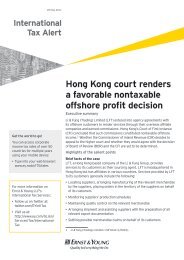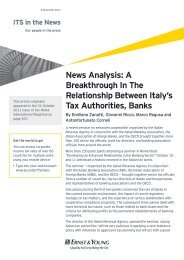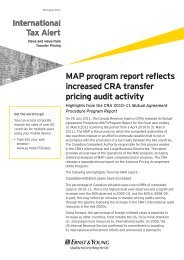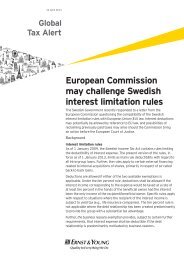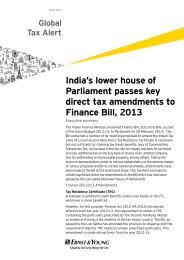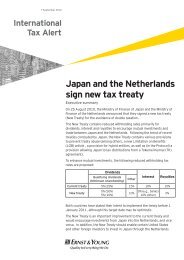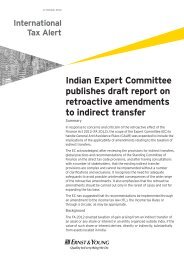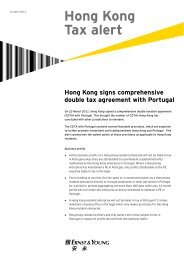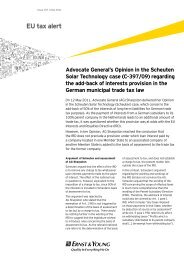Download - Ernst & Young T Magazine
Download - Ernst & Young T Magazine
Download - Ernst & Young T Magazine
Create successful ePaper yourself
Turn your PDF publications into a flip-book with our unique Google optimized e-Paper software.
Credit: Keystone / EPA / Julien Warnand<br />
Martin Schulz, President of the European Parliament<br />
Interview<br />
Toward integration<br />
Martin Schulz<br />
is Member of the<br />
European Parliament<br />
for the Social Democratic<br />
Party of Germany,<br />
since 2004 leader of<br />
the Socialists in the<br />
European Parliament.<br />
In January 2012, the<br />
56-year old politician<br />
was elected President<br />
of the Parliament.<br />
One complication facing multinational<br />
organizations trying to relocate and develop more<br />
rounded global executives is the national barriers<br />
that inhibit the free movement of labor. Even<br />
within an integrated region such as the EU, this<br />
can prove difficult, not least due to differing social<br />
security schemes and tax regimes. T <strong>Magazine</strong><br />
speaks to Martin Schulz, the new President of the<br />
European Parliament, about what is being done<br />
to create a more flexible labor market.<br />
What is being done from a political perspective,<br />
at both a national and European level,<br />
to eliminate the barriers to cross-border tax<br />
and social insurance legislation and<br />
facilitate more flexibility on the international<br />
labor market?<br />
Martin Schulz: I must point out, unfortunately,<br />
that there are practically no borders for capital<br />
any longer, whereas in terms of labor mobility, the<br />
freedom of movement for workers, there are still<br />
considerable obstacles. However, many fiscal<br />
issues and, above all, decisions relating to the<br />
labor and social sector are still the national<br />
responsibility. I regret this since, in Europe, it<br />
means we are faced with fiscal and social<br />
competition between one another, usually with a<br />
downward tendency, which is damaging to the<br />
economy in many of our countries. This<br />
754<br />
The European Parliament is<br />
the only directly-elected<br />
EU body and one of the largest<br />
democratic assemblies in<br />
the world. Its 754 Members<br />
are there to represent the<br />
EU’s 500 million citizens.<br />
complicates the desired convergence of our<br />
economies and ultimately does not lead to<br />
sustainable growth for the Member States. I see<br />
our social model as a key to the economic success<br />
of the European Union and it will play an essential<br />
role in overcoming the current crisis. All the<br />
same, the European Parliament will continue to<br />
press for decisions in important fiscal matters –<br />
whether toward the harmonization of corporate<br />
tax assessment bases or toward a financial<br />
transaction tax.<br />
What are Germany and/or the EU doing to<br />
standardize the various pension regulations?<br />
Our disadvantage as an economic zone –<br />
compared, say, with the USA – is the coexistence<br />
of 27 different national systems. Of course,<br />
variety and difference can also be a bonus: I am<br />
against total standardization. But what we do<br />
need is a common framework and common rules,<br />
so that workers can move inside the EU without<br />
barriers. Yes, superannuation and pension<br />
schemes are a matter for Member States. But the<br />
European Parliament will support any steps<br />
aimed at helping enable workers to retain their<br />
retirement pension claims if they move from one<br />
Member State to another. However, in that<br />
process, there should be no need to weaken<br />
national social standards.<br />
One of the key areas of harmonization<br />
lies within the financial services sector.<br />
What else needs to be done here?<br />
As noted, capital nowadays can be transferred<br />
between countries almost instantaneously. But<br />
many financial centers are only inadequately<br />
regulated, a situation that can cause substantial<br />
damage to our economy. I firmly believe that<br />
politicians have to help to set clear guidelines<br />
here, which is why I wholeheartedly support<br />
measures taken within the G20 framework – it is<br />
in this area that we must take joint action. The<br />
European Parliament has already made an<br />
important contribution by limiting certain kinds of<br />
short selling in particular and by generally<br />
creating more transparency on the derivatives<br />
trading market.<br />
<strong>Ernst</strong> & <strong>Young</strong> Issue 07 T <strong>Magazine</strong> 13



